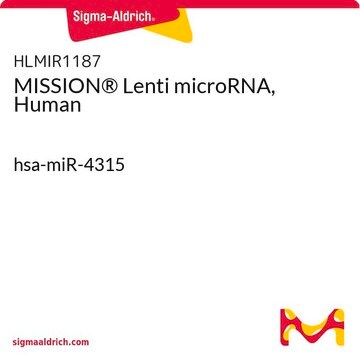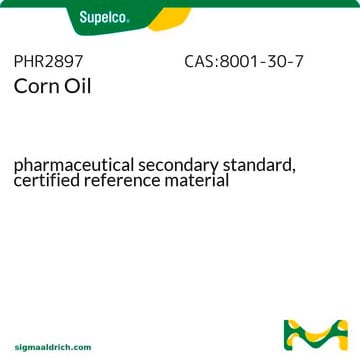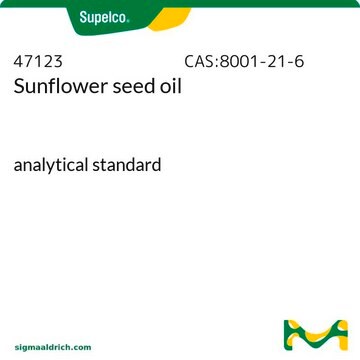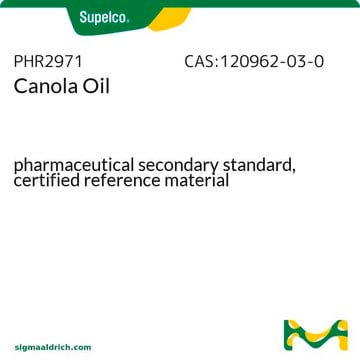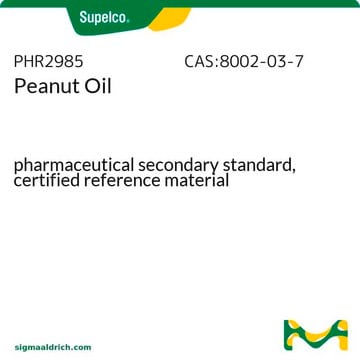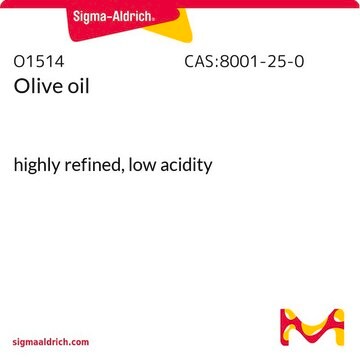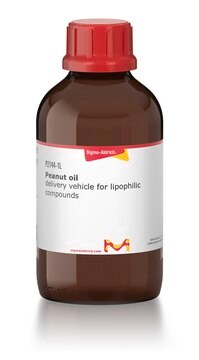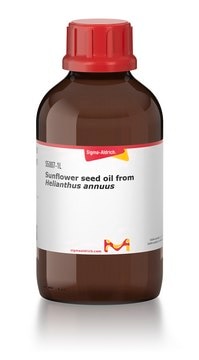47112-U
Corn oil
analytical standard
Synonym(s):
Maize oil
Sign Into View Organizational & Contract Pricing
All Photos(1)
About This Item
Recommended Products
grade
analytical standard
Quality Level
CofA
current certificate can be downloaded
packaging
ampule of 1000 mg
technique(s)
HPLC: suitable
gas chromatography (GC): suitable
application(s)
food and beverages
format
neat
storage temp.
2-30°C
Looking for similar products? Visit Product Comparison Guide
General description
This reference material is offered as a qualitative standard. Use the chromatographic fingerprint of our reference material to check for the presence of corn oil in your sample. A Certificate of Composition which includes a chromatogram is shipped with each product. Characterized corn oil samples are available for use as controls or check samples for fatty acid methyl ester (FAME) analyses. These reference materials can be used as qualitative standards. They provide an excellent means of standardizing the lipid procedures and comparing the results to others. Packed in an amber ampule under nitrogen. A Certificate of Composition, which includes the chromatographic fingerprint analysis, is provided with the oil sample.
Application
Refer to the product′s Certificate of Analysis for more information on a suitable instrument technique. Contact Technical Service for further support. Corn oil is used as a characterized reference standard to investigate its fatty acid composition using gas chromatography technique after subjecting it to transesterification reaction.
Storage Class
10 - Combustible liquids
wgk_germany
awg
flash_point_f
489.2 °F - open cup
flash_point_c
254 °C - open cup
ppe
Eyeshields, Gloves
Choose from one of the most recent versions:
Already Own This Product?
Find documentation for the products that you have recently purchased in the Document Library.
Customers Also Viewed
Hui Li et al.
Nature genetics, 45(1), 43-50 (2012-12-18)
Maize kernel oil is a valuable source of nutrition. Here we extensively examine the genetic architecture of maize oil biosynthesis in a genome-wide association study using 1.03 million SNPs characterized in 368 maize inbred lines, including 'high-oil' lines. We identified
Lisa D Yee et al.
Molecular nutrition & food research, 57(2), 320-327 (2012-12-06)
We previously demonstrated that lifelong feeding of diets enriched in n-3 fatty acids such as docosahexaenoic acid (DHA) and eicosapentaenoic acid (EPA) significantly inhibits HER-2/neu-mediated mammary tumorigenesis in mice. Of interest is whether dietary n-3 fatty acids exert effects at
Hua-Min Liu et al.
Bioresource technology, 128, 58-64 (2012-12-01)
Hydrothermal liquefaction of cornstalk at 180-300 °C at ratios of water to cornstalk of 6-14 was conducted, and the reaction products were lumped into gas, water-soluble organics (ethanol-insoluble and ethanol-soluble organics), heavy oil, volatile organic compounds, and acid-soluble and acid-insoluble
B G Kim et al.
Journal of animal science, 91(2), 755-763 (2012-11-14)
An experiment was conducted to determine the true ileal digestibility (TID) and the true total tract digestibility (TTTD) of acid-hydrolyzed ether extract (AEE) in extracted corn oil, high-oil corn, distillers dried grains with solubles (DDGS), corn germ, and high protein
Aimin Shi et al.
Bioresource technology, 128, 100-106 (2012-12-01)
Six Korea high oil (KHO) corn varieties varying in germ and endosperm size and oil content (4-21%, wet basis) were subjected to three sequential combinations of milling (M), germ separation (S), fermentation (F), and in situ transesterification (T) to produce
Our team of scientists has experience in all areas of research including Life Science, Material Science, Chemical Synthesis, Chromatography, Analytical and many others.
Contact Technical Service